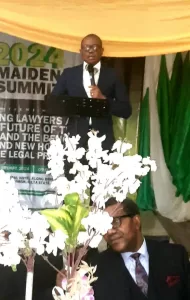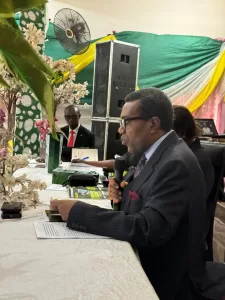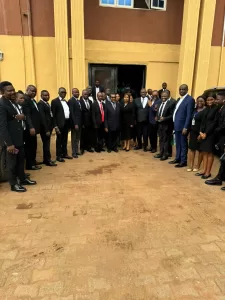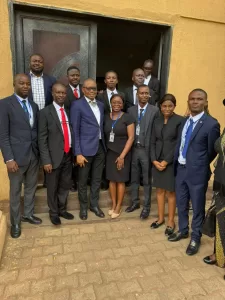AFAM OSIGWE URGES SUPREME COURT REFORMS, ADVISES YOUNG LAWYERS
Afam Osigwe SAN Advocate For Urgent Reforms To Address Supreme Court Caseload
Afam Osigwe, a Senior Advocate of Nigeria, has emphasized the need for urgent reforms to address the heavy caseload burdening the Supreme Court.
Speaking on national television, Osigwe decried the large number of cases across all types of legal disputes that reach the apex court. He noted that this overworks the few justices available to adjudicate the matters.
The senior lawyer suggested amending the constitution to restrict certain cases from proceeding beyond the appeal courts of each state. He proposed that only cases involving substantial points of law or conflicts of appeal court decisions should reach the Supreme Court.
Osigwe also advocated appointing more justices to bring the Supreme Court to its full complement of 21 members. This would allow the court to sit in various panels and quicken dispensation of pending cases.
The time it currently takes for certain types of cases to reach the Supreme Court averages around 12 years, a situation that affects litigants and legal practitioners. Osigwe cited instances where cases are repeatedly adjourned, causing significant delays. These delays are not due to any fault of the parties involved but result from the sheer number of cases and a decline in the number of available justices.
Osigwe also suggested broadening the pool of candidates considered for appointment to the Supreme Court bench. He argued for diversifying the sources of appointments, extending the selection process to include academics, individuals from private practice, and judicial officers with over seven years of experience.
This expansion of the selection criteria would ensure that the pool of potential Supreme Court justices grows, ultimately addressing the recurrent issue of a declining number of justices at the Supreme Court.
The Senior Advocate stressed that reforms are urgently required to reduce the average 12-year timeline for cases at the apex court. He stated that justice delayed is justice denied and backlogs due to limited judges disadvantage litigants.
“Equipping Young Lawyers for the Digital Age: Afam Osigwe’s Advocacy at the Young Lawyers Forum Agbor Branch Summit’’
At the Young Lawyers Forum Agbor Branch summit, Afam Osigwe, SAN, passionately advocated for the necessity of equipping young lawyers with IT and digital skills in light of the rapid development of technology in legal practice.
In his keynote address on the topic “Young Lawyers as the Future of the Bar and Bench; ICT and New Horizons of Legal Practice,” the learned silk emphasized the pivotal role of young lawyers as not merely participants, but architects of the evolving legal profession. He stressed that our ability to adapt, innovate, and harness the potential of ICT will define the trajectory of the bar and bench for years to come. While acknowledging the weight of this responsibility, Osigwe also highlighted the incredible opportunity it presents for young lawyers to lead positive change and drive progress in our noble profession.
Challenges on the Horizon:
Osigwe also acknowledged the challenges inherent in integrating ICT into legal practice, with the digital divide being one of the primary obstacles. He underscored how this divide exacerbates existing disparities in access to technology and legal resources, particularly in rural or underserved areas where limited internet connectivity and technological infrastructure hinder the adoption of ICT tools, thereby creating barriers to justice for marginalized communities.
Tackling the Digital Divide:
To confront these challenges head-on, Osigwe advocated for a multifaceted approach encompassing advocacy, education, and collaboration. He emphasized the importance of advocating for policies and initiatives that promote universal access to technology and broadband internet, especially in rural areas. By engaging with policymakers and technology stakeholders, Osigwe urged young lawyers to champion efforts aimed at bridging the digital divide and ensuring that every individual has equitable access to technology in the digital age.
Promoting Digital Literacy:
Recognizing that proficiency in using technology for personal purposes does not necessarily translate to the specialized skills required for ICT-driven legal practice, Osigwe stressed the critical importance of promoting digital literacy and skills development among legal professionals and the broader community. He advocated for investment in training programs, workshops, and continuing education opportunities to equip young lawyers with the knowledge and skills needed to navigate the digital landscape effectively and leverage ICT tools to enhance legal practice.
Upholding Ethical Standards:
Osigwe also underscored the ethical complexities inherent in ICT-driven legal practice, from safeguarding client confidentiality in an era of data breaches to ensuring the integrity and reliability of AI-driven legal analysis. He emphasized the paramount importance of upholding the highest ethical standards as stewards of justice. By adhering to established ethical guidelines, staying informed about emerging issues, and seeking guidance from mentors, young lawyers can navigate the ethical challenges of ICT with integrity and professionalism.
Collaborative Solutions:
Finally, Osigwe emphasized the necessity of adopting a collaborative and interdisciplinary approach to address the challenges of ICT in legal practice. He urged young lawyers to forge partnerships with technology experts, policymakers, and community organizations to leverage collective expertise and resources in developing innovative solutions that promote access to justice, enhance efficiency, and uphold ethical standards. Through collaboration, young lawyers can harness the full potential of ICT to create a more inclusive, equitable, and effective legal system for all.
Afam Osigwe, SAN’s keynote address served as a rallying cry for young lawyers to embrace the opportunities presented by ICT while simultaneously addressing the challenges it poses. By equipping ourselves with IT skills, advocating for universal access to technology, promoting digital literacy, upholding ethical standards, and fostering collaboration, young lawyers can indeed serve as catalysts for positive change in the legal profession, ensuring that justice remains accessible to all in the digital age.
To join our CITY LAWYER platform on WhatsApp, click here
To join our Telegram platform, click here
COPYRIGHT 2022 CITY LAWYER. Please send emails to citylawyermag@gmail.com. Join us on Facebook at https://web.facebook.com/City-Lawyer-Magazine-434937936684320 and on “X” (TWITTER) at https://twitter.com/CityLawyerMag. To ADVERTISE in CITY LAWYER or for Special Features, please email citylawyermag@gmail.com or call 08138380083.
All materials available on this Website are protected by copyright, trade mark and other proprietary and intellectual property laws. You may not use any of our intellectual property rights without our express written consent or attribution to www.citylawyermag.com. However, you are permitted to print or save to your individual PC, tablet or storage extracts from this Website for your own personal non-commercial use.






